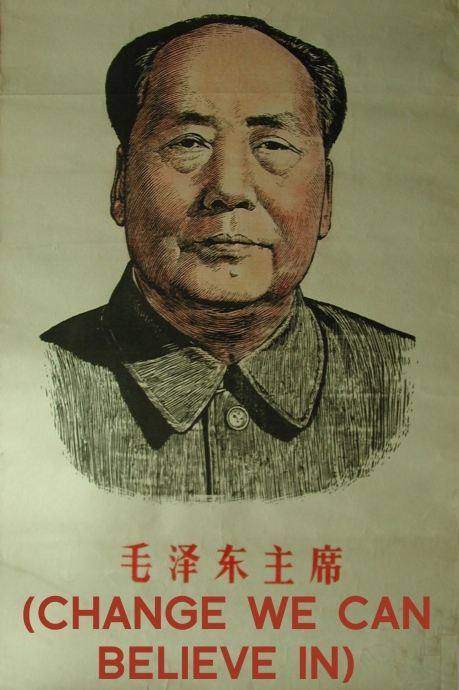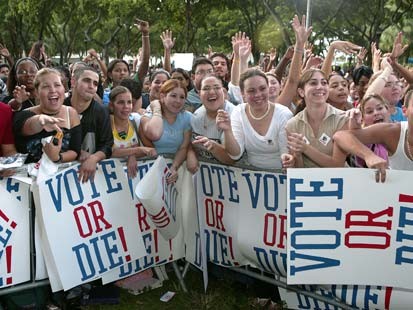I’m Back! | Are Campaigns Just Games? January 20, 2010
Posted by Jamie Friedland in Congress, Election, Media, Politics.Tags: Campaigns, Congress, Democracy, Democrats, Elections, Flip Flop, Martha Coakley, Massachusetts, Pandering, Politics, Republicans, Scott Brown, Senate, Special Election, Voter Turnout, Voting
add a comment
I’m back. I haven’t posted for a few months because I was working in a political internship where I was not allowed to blog. That has ended, so I will be writing again. Please read on:
Campaigning and governing are two very different things. The obviousness of that statement is a serious problem. Yesterday’s “surprising” special election in Massachusetts is a case study in why the separation between these two processes is detrimental to our country.
State Attorney General Martha Coakley was a terrible campaigner. Gaffes drive election coverage, and her short campaign had media outlets drooling. But is she any less fit to govern now than she was when she clinched the Democratic nomination? No.
Massachusetts is fairly considered a Democratic state. Currently, voters have elected Democrats into every state executive office, 89.5% of its state legislature and, until Senator-elect Scott Brown is sworn in, 100% of its congressional representatives. It is safe to say that a majority of Bay Staters embraces the Democratic policy agenda.
The first poll after the primaries showed Coakley 15 points ahead of Brown. Eleven days later, the final poll showed Coakley 9 points behind Brown. Yesterday, she lost by 5 points. Polls are inaccurate, but during those two weeks a significant portion of voters changed their minds, either about the candidates or about their decision to vote.
In a democratic republic, citizens elect representatives to legislate on their behalf. It is clearly within a person’s interest to vote for someone who shares his or her policy perspective. So congressional elections should be about policy, the laws each candidate will support. Unfortunately, campaigns have lost sight of this because we, the voters, have let them. The media enable and cultivate this electoral perversion.
The Coakley-Brown campaign was largely devoid of policy. Yes, Brown was going to (and now will) vote to block healthcare reform. What will he do after that? He ran a campaign ad featuring his truck. Not one of Coakley’s “gaffes” was policy-related. Some might point to her Afghanistan comment, but that was a defensible opinion. All we heard about in the news was an admittedly egregious typo of her state’s name. Not a word about what she would do as a senator.
We as a country neglect policy in campaigns. Since 2004, it is political suicide to reverse a policy position, even in the face of new, better information; “flip-flopper” is a politician’s death knell. Brown actually did successfully flip his stance on climate to pander to Tea Partiers, but that was before the primaries, and this election was not about climate change. None of the drastic poll movement over the last two weeks can be attributed to policy positions because they didn’t change. So what did? And can it possibly be more important than policy?
“Reducing carbon dioxide emission in Massachusetts has long been a priority of mine” -Scott Brown in 2008, after voting for RGGI, the regional cap and trade system among Northeastern power plants.
“It’s interesting. I think the globe is always heating and cooling. It’s a natural way of ebb and flow.” – Scott Brown in 2010, pandering to the ignorance of the extreme right.
Campaigns have become a sport of their own. Candidates are being evaluated on a scale separate from how well they would govern. It’s like drafting a basketball player based not on his skill but rather on how many people would want to come to see him. Sarah Palin comes to mind. President Obama does too, but he can dribble and shoot. Still, campaign prowess and governing ability are not inherently correlated, and we cannot continue conflating the two.
Scott Brown definitively won his campaign. Or rather, Martha Coakley definitively lost hers. But I challenge the notion that Senator Brown will represent the majority opinion of the state of Massachusetts. And if that’s true, the system is flawed.
So what to do? If most of the state’s registered voters had turned out last night, the state would be more accurately represented. Perhaps voting should be mandatory, an official civic duty instead of a “freedom” to be celebrated and then apathetically shirked on election day. A Massachusetts election official projected last night’s “explosive” turnout to be in the 40% range.
It is hypocritical for us to hold up our democracy as the model government while recording unremarkable if not weak voter turnout on an international scale (check out this website for some interesting international election statistics). Yet unless people take much more time to educate themselves about the issues, mandatory voting would be no solution. At least today’s voters care, even if some opinions are based on the distortions of demagogues.
If elections are truly about selecting the best people to govern, I propose we completely remove the pageantry from the campaign process. Congressional representatives, unlike presidents, have essentially one task: creating legislation. So we should vote for person who will enact the policies we support most.
Therefore, let every candidate write down his or her ideal prescriptions for each major policy area. Compare and contrast the answers. Publish and widely circulate that document. Then let us choose the best person for the job. Who cares what kind of car they drive? What does it matter which sports teams they support? These are unnecessary distractions. Let the media provide the electorate with enough information to pick an effective legislator and then go report real current events. Surely there’s a little boy in a balloon somewhere.
We should vote for the right reasons. And we should all vote.
Please Complain January 27, 2009
Posted by Jamie Friedland in Climate Change, Coal, Congress.Tags: Bill O'Reilly, Boehner, Bush, Dissent, Energy Efficiency, Hybrids, Mass Transit, Oberstar, President Obama, Rail, Stimulus, Transportation, Voting
add a comment
A week ago, I was chatting online with a conservative friend during the inauguration. Although she was “mourning g dubs,” she told me she was going to be a “good American” and support the president rather than complain as my fellow Democrats and I have for the last eight years. I told her that it’s her right to object if and when President Obama screws up, but she rejected this idea because apparently silently accepting injustices is “what patriots do.”
President Obama will make mistakes. Many say he already has. But the notion that it is un-American or whiney to disagree with a president is disturbing, even when voiced by a classmate rather than Bill O’Reilly. Theodore Roosevelt put it best: “To announce that there must be no criticism of the president, or that we are to stand by the president, right or wrong, is not only unpatriotic and servile, but is morally treasonable to the American public.” Dissent is a crucial and protected part of the democratic process. And isn’t being able to complain one of the stated (albeit secondary) reasons to vote?
I am a zealous Obama supporter and worked for the campaign for a full year and a half. I am also not subtle about my political preference and have my apartment/car/room so shamelessly adorned that my friends across the hall hung a giant Chairman Mao “Change We Can Believe In” poster and named their wireless network “HopeAndChange” (because it too is intangible and frequently lets them down) to mock me. But even I do not agree with everything President Obama has done.

Very funny, guys.
The House of Representatives is currently mulling over the American Recovery and Reinvestment Act, the pending “stimulus package.” While it is wonderful to see money going towards renewable energy and needed infrastructure, the plan revealed last week already saw relevant funding cuts from the earlier proposal outlined by James Oberstar (D-MN), Chairman of the House Transportation and Infrastructure Committee. The money allocated to roads remains untouched, but the overall transportation investment fell 25%, with rail in particular cut 78%. That money will instead fund a tax cut. It is unclear who made the revision, but if the Obama administration truly prioritized mass transportation and energy independence, they could have prevented this edit.

California has its own plans for a high-speed rail system, but the rest of us will still just have (underfunded) Amtrak.
Overall, there is a lot of good funding in the initiative, especially after the Bush years. But not everyone thinks so. House Minority Leader John Boehner (R-OH) recently went on PBS’s Newshour and was “shocked” by what he saw in the bill. He singled out one particularly egregious item as an example of the “same kind of wasteful spending we have seen in the past”: $6.2 billion for communities to weatherize low-income housing.
First of all, a government-funded community weatherization program does not sound like any past I can remember (although apparently there was a similar program in the mid-1990s, which the GOP opposed then as well). As Climate Progress reports, this opposition is all the more ridiculous because such programs not only create jobs, they decrease the deficit! Exactly what disgusts Boehner about lowering people’s electricity bills, generating work in low-income areas, and even reducing America’s energy needs is beyond me – or would be if he wasn’t such an overt ally of the energy industry.
It is unfortunate that efficiency measures aren’t as “sexy” as building a new, state-of-the-art power plant, because they can provide the same benefit, pollution-free, for less. Earlier this month, the coalition Wise Energy for Wise County released a major study demonstrating why a new coal-fired power plant is not the energy solution for Wise County Virginia (or America). As Theo Spencer at NRDC explains, their study determined that investing in energy efficiency instead of a new plant could meet the same electricity demand, yield hundreds of millions of dollars for the state each year, and create at least 2,600 more jobs than the power plant. And if the federal government does implement a carbon tax or cap and trade system, the comparative benefits of efficiency become even greater.
What’s true for Wise County is largely true for our entire country. There are incredible opportunities to improve energy efficiency today using technology we already have: insulating buildings, improving mass transit, driving higher MPG, hybrid, and even zero-emission electric vehicles, buying EnergyStar appliances, utilizing natural lighting and compact fluorescent light bulbs…the list goes on. Even for power production, cogeneration, also known as combined heat and power (CHP), enables us to tap waste heat at power plants to provide industrial or domestic heating and hot water nearby. Yet all of these cost money before they save it.
I think it is in our government’s interest to heavily incentivize and provide funding for many of these measures, but it is clear that some policymakers have different priorities. So I will continue to “complain” by writing congresspersons, raising awareness about these issues, and hopefully, by being hired to work somewhere that I can help effect the changes I’d like to see. And if you disagree with the government, even if we do have an articulate, intelligent president, it is your right and even civic duty to do the same.
A version of this post ran in The Chronicle at Duke University.
The Student Vote November 3, 2008
Posted by Jamie Friedland in Election.Tags: Corruption, Election, George W Bush, Politics, Voting, Youth Vote
1 comment so far
My fellow Young Americans: Please wake up.
As a kid, I had a friend who was epically bad at “hide and seek.” Employing some flawed, kindergarten-level logic, he concluded that when he closed his eyes, he became invisible (to other people too). As childish as that is, there is an analogous situation among some of our peers today. Our government’s decisions affect everyone who lives here, but many young people tune out as if ignorance could shield us from energy crises, potentially lost abortion rights, and… well, economic Armageddon. Compared to older age demographics, today’s college students are largely apathetic about politics.
It was not always this way.
During the 1960s, college campuses were bastions of political activism. Students followed politics closely and demonstrated when they felt the government had misbehaved. That generation was incited by the Vietnam War and united by the energy and experiences of the Civil Rights Movement. Today, we have a similarly unpopular war in Iraq and a government marred by frequent allegations of corruption, but our campuses are torpid in comparison.
So what has changed? The anti-war sentiment in the ’60s was strengthened by self-interest – some students protested because they didn’t want to be drafted. But our parents’ generation was motivated by idealism and indignation as well. The complacency among today’s youth is symptomatic of a greater problem.
We have grown up in an era of scandal. That in and of itself is not so remarkable; today’s politicians did not invent the abuse of power. Yet from George Tenet’s WMD controversy to the Abramoff lobbying fiasco and a long list of disgraced Congresspersons, we have seen our share of corruption. What separates the misdeeds of the last eight years is that they have gone largely unpunished. The Bush administration deceived the nation into a costly war, tortured detainees, and exercised illegal partisanship in its firing of federal prosecutors. But when the media break these stories, nothing happens. Congress has called high-level officials to testify, but even the Attorney General and Vice President have ignored subpoenas or claimed incredible memory loss under oath. With the exception of Scooter Libby, who was convicted of perjury and obstruction of justice in the Valarie Plame case, this administration has protected itself from repercussions (even before lame duck pardons).
As a result, we have become desensitized to corruption. Every American faces the same truth that an individual vote makes little difference. However, older voters have lived through different administrations and seen how votes can affect their lives. For today’s college students, many of whom were barely teenagers when George W. Bush was elected, the government appears to be a static entity. In 2000, likely the first election today’s young voters followed, Bush won without the popular vote by a Supreme Court decision. Then voting controversies plagued the 2004 election. That doesn’t inspire trust in democracy. College students are less likely to cast a ballot than their elders, but we have just as much at stake, if not more. Our generation needs to be more politically active.
I know we’re not all sitting around shirking our civic duty; many of us do care and work hard to better our communities. So why don’t we vote? According to CIRCLE (the acronym is annoying; I refuse to expand it out of spite), students don’t vote because politicians don’t target us. A researcher at Yale explains that campaigns don’t target youth voters because we historically do not donate much money. Others blame the decline in civics classes, and students themselves point to registration difficulties, convenience and the question of whether a single vote matters. In the face of these setbacks, youth voter turnout has been slowly rising since 2000, but it still barely broke 50 percent in 2004.
According to the 2006 census, there are 29.5 million potential voters under 24, and nearly a quarter of the American electorate is under the age of 30 (which technically comprises the ‘youth vote’). But even college students alone could wield significant electoral influence. And it appears that this year our voices will be heard. A recent survey of students in four battleground states found that an astounding 94 percent were registered to vote. But it’s not official until your ballot is in the box.
Tomorrow is Nov. 4. If you haven’t voted yet, please head to the polls and show the country that we’re ready to take America in a new direction. It’s time to take our future back.
A version of this post ran in The Chronicle at Duke University.



